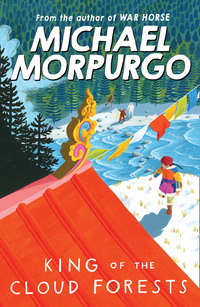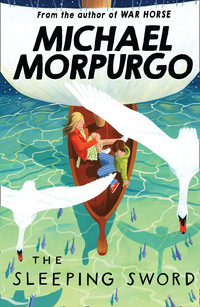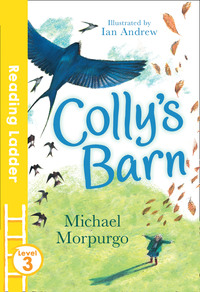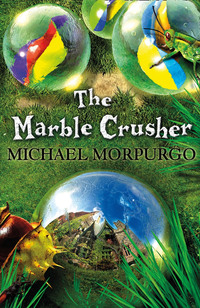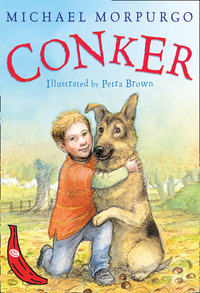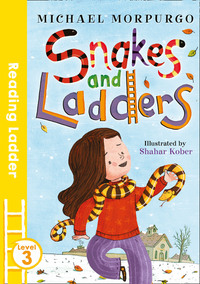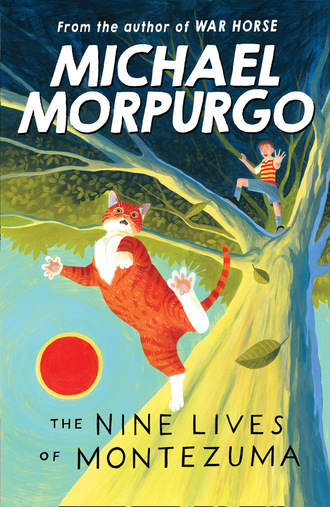
Полная версия
The Nine Lives of Montezuma

Also by Michael Morpurgo
Arthur: High King of Britain
Escape from Shangri-La
Friend or Foe
From Hereabout Hill
The Ghost of Grania O’Malley
Kensuke’s Kingdom
King of the Cloud Forests
Little Foxes
Long Way Home
Mr Nobody’s Eyes
My Friend Walter
The Sandman and the Turtles
The Sleeping Sword
Twist of Gold
Waiting for Anya
War Horse
The War of Jenkins’ Ear
The White Horse of Zennor
The Wreck of Zanzibar
Why the Whales Came
For Younger Readers
Conker
Mairi’s Mermaid
On Angel Wings
The Best Christmas Present in the World
The Marble Crusher

CONTENTS
THE BEGINNING
THE SECOND LIFE
THE THIRD LIFE
THE FOURTH LIFE
THE FIFTH LIFE
THE SIXTH LIFE
THE SEVENTH LIFE
THE EIGHTH LIFE
THE END
THE BEGINNING
THE BARN OWL HAD BEEN WAITING FOR some time high up in the rafters of the dutch barn. He was a young barn owl and had not yet the patience of an experienced adult. He had been hunting for some months now, making slow, silent sorties along the hedgerows, his eyes scanning the undergrowth for the sudden inexplicable movement that might betray the prey beneath. For hours he had waited perched among the elms surveying the darkness below before gliding out through the branches and swooping down, talons poised and primed for the kill. But too often his balance and timing still failed him. He would find himself taking off too early, allowing his quarry too much time to elude him. He had not yet perfected the technique of waiting for the right moment that all efficient hunters need if they are to make a good kill. Hunger gnawed at his stomach, concentrating his mind. He sat still on his perch like a white sentinel, and waited.
Far below him in a hollow between two bales of hay lay the old she-cat, stretched out to allow her young to suckle. One kitten was already dead and lay cold, damp and alone. The three survivors fought for their mother’s milk, clambering over each other in blind hunger, probing for the wet warmth of a teat amongst the soft fur of her belly. She was aware that the owl was watching. She had seen him swoop in from the night and sit high above her, fold his wings back and settle down. She would have moved her kittens, had she had the time, but they had only just been born and she was too exhausted to move. Anyway, she knew that they were safe so long as she stayed with them. She lifted her head and glanced almost casually up at the owl above her. It was a waiting game, a stand-off; and she could wait as long as he would. She curled round and licked over her litter so that they tumbled from her mewing and pawing the air in a frantic effort to retrieve their feeding places. The she-cat cleaned them individually all over and then nudged them back so that they could feed again. She looked for a moment at the dead kitten and then stretched out and gave down her milk.
Dawn was filtering the darkness and the owl shifted perceptibly on his branch, uneasy now at the long wait. His patience had been tried for too long. His eyes blinked black, once, twice: and he lifted himself easily off the rafter, spreading his wings to begin the slow glide down towards the cat. Half in sleep she heard the rush of wind against his wings and was at once alert to the danger. She sprang up, shielding her young, and spitting defiance as the owl swooped down. She backed away, lifting her front paws to fend him off; but the owl had seen his chance, the undefended kitten lying apart and still in the corner of the hollow. He turned, wheeled powerfully and came in again his talons out-stretched. He had but to choose the right angle of attack to avoid those unsheathed claws and the kill would be his. There was scarcely a hesitation in his flight as he plucked the dead kitten from the hay and swung away up over the bales and out into the grey of dawn, leaving behind the old she-cat still spitting her anger after him.
Her dead kitten had been her family’s safe passage. Now there was time to move out of reach of intruders, deeper into the sanctuary of the haystack. One by one she picked up her kittens and carried them in her mouth down the hay stack and up into the old straw where the bales were less tightly packed and where some bales had fallen apart. Finding a safe place took some time; but finally, with the first kitten in her mouth, she found a suitable burrow and squeezed her way in, depositing the kitten at the bottom. Then she went back for the others. This was the danger period when each of the kittens in turn had to be left, and the old she-cat ran and leapt again like a young cat. Perhaps the owl returning, a rat, or even another cat might come upon the kitten while she was gone. Only when the task was done and they were all three suckling her in their prickly new nest, did she feel safe.
Over the next few days, in the musty darkness of their new home the kittens’ eyes began to unstick, and they had their first blurred impression of light. They were still too weak to explore and yearned only for the warmth and food that their mother provided. Secure now from the owl, the she-cat had begun leaving her litter for short periods. She had to feed herself if her litter was to survive. To start with it would be a matter of minutes only until she returned, but as the kittens grew and as time went on she took to wandering further afield to hunt, and she returned only when her hunger had been satisfied.
From the dead beech tree by the duck pond, the young barn owl had been watching her comings and goings much as a conspiring bank robber watches a security guard. Each evening after he had taken the dead kitten he had flown in and searched for the rest of the litter. That they were there he knew for certain, but he had not yet been able to locate them. This evening he waited for the she-cat to climb the hedge into the meadow and watched her as she padded into the trees beyond and vanished. Then he leapt down onto the wind and floated across into the barn.
The three kittens were still groping after the warmth of their mother, two of them silently; but the third was calling after his mother, his mewing turned to high-pitched wails of anxiety as he discovered she was gone. From his observation post near the roof the owl heard, registered, and blinked his round black eyes. He could not see them, but he had them pinpointed now. He would be back.
The spring had been late in coming and the animals on the farm were still indoors, still waiting for the land to dry and the grass to grow through. Each morning and evening the yearlings in the granary needed to be fed with hay and their bedding made up with straw. During the school holidays this was the boy’s task whilst his father finished the milking and washed down the dairy.
It was evening and he was in the big hay-barn throwing down the bales of straw for the bedding when he came across the three kittens. They were alone, piled up in a heap that wriggled suddenly to life as he moved away the bale that had been the roof of their nest.
He was about to shout out to his father that old Kitty, the she-cat, had done it again; but he decided against it. His father would drown them in the pond as he had done many times before. His father liked to keep a tidy farm, and too many cats implied there might be too many mice and rats. One or two of them served a useful purpose; more than that and they were always under your feet and hanging around the back yard. The boy thought for a moment, and then replaced the bale purposefully. If they could stay there undiscovered for a week or so, then he knew his father would stay his hand even if they were found after that. His father would drown them only in the first week or so of life, before their eyes were properly open.
The boy always fed the pigs after milking and then went back indoors where his mother would have a hot cup of tea waiting for him. He pulled off his boots, threw his coat in a corner and flopped down in the big kitchen chair by the stove.
‘Your father’s been and gone,’ said his mother, pouring out the tea automatically.
‘What’s he gone out for? He’d just about finished up when I left.’
‘He came in for a sack.’
‘What for?’ The boy tried his tea but it was too hot.
‘That old cat has had kittens again,’ his mother said.
‘You mean Kitty?’ The boy knew what had happened but wanted to know how. The kittens had been well hidden. ‘Where did he find them?’ he asked.
‘He said you were one bale short on the straw. There wasn’t enough for the yearlings.’ There was a hint of reproof in his mother’s voice. ‘So he had to go back into the big barn and fetch one and he found them in under the bale he picked up.’
‘How many, Mum?’
‘Didn’t say, but that Kitty never produces less than three or four.’
‘In the pond? Is that where he will do it?’
‘I expect so, dear; it usually is. Now drink your tea. It will get cold.’
As the boy sipped his tea and warmed his hands on the cup, he began to wonder how his father, normally the gentlest man he knew, could bring himself to do it. And that led on to his wondering if he himself was really right to be a farmer. He loved to raise the animals and watch them grow, but he found the killing difficult to take. Of course he knew that all his stock ended up in the abattoir, but that after all was how they made their living. It was a part of the farming and he could accept it, just so long as someone else did the killing. He could never contemplate killing with his own bare hands, not so close that you can feel and hear the animal. Shooting was different; there was sport in that, and anyway killing with a gun at a distance was no problem to him.
His father was back. The boy heard him stamp his boots outside the door and waited for the usual comment about his coat.
‘I see your coat’s on the floor again,’ said his father whipping off his stiff flat hat and hanging it up. ‘By gad, you youngsters these days, you’ll never learn.’
He ignored his father. ‘Did you drown them, Dad?’
‘All done,’ he said. ‘They were only just born. They wouldn’t know anything about it.’
‘How many did she have, Dad?’ the boy asked.
‘Two. Just two this time. It’s a business. I wish she’d go off and have them somewhere else. Silly old cat, she must know I’ve drowned more than half of the kittens she’s ever had. You’d think she’d have the sense to go elsewhere. Any tea left in the pot?’
‘Just two then, Dad? You didn’t see any more?’ His father shook his head. There had been three kittens, of that the boy was quite certain.
‘That old cat won’t miss them,’ said his mother. ‘Those we don’t drown she deserts before they’re properly weaned, and I know she eats them herself sometimes. She’s a terrible mother; we ought to have had her fixed years ago. Would’ve saved all this trouble.’
The boy stood up, mumbled something about leaving his torch behind in the pigs’ house, slipped his boots on and went out.
The lone kitten had managed to scramble about back up onto the bale which was his home. In a desperate search for his absent mother he had toppled off the bale and fallen into a deep crevasse between the bales below; and it was that that had saved his life. Stumbling about in the darkness he searched now for the warmth of his mother and cried out for her. He lifted his nose scenting the night air and explored every corner of his home. His family had gone, and the plaintive mewing turned to a cry of panic as the realisation that he was alone took hold of him.
It was this sharp cry that attracted the white owl perched in the beech tree by the pond. He had been watching a water vole that kept pushing its head out of its hole in the muddy bank by the stump of an old alder tree. He was waiting for it to emerge, but had the feeling that it might never happen. The cry from the barn was a reminder to him. He needed no further invitation. He knew the place and guessed from the fear in the cry that the kittens were alone. He circled the barn and came in to perch on the rafter just above the nest. Even before he landed he had spied the kitten alone and exposed, groping its way across the bale. The great black eyes focused and blinked. His head turned on his neck searching out the barn for the she-cat. But there was no sign of her. He paused momentarily to be sure and then lifted his wings and fell through the air, his legs outstretched, his talons spread.
From her hunting ground by the grain store, the old she-cat had heard her kitten. The hunting had been poor, and she knew she had left her kittens for too long. She came in under the big barn doors just as the owl took off. Within the space of a second she was by her kitten and standing her ground. The owl wheeled away only feet above the squirming kitten, shocked at the sudden intrusion; but he came back again with renewed fury. He had been certain of a kill. Three more times he came in, his talons almost touching the shecat’s paws, but the last time he saw the anger and ferocity in her eyes and he feared it. He knew the game was lost and with long powerful strokes of his great white wings he soared out of the barn and back up into the beech tree. There he snapped his beak in frustration and settled down to wait for a chance at his alternative kill, the water vole. But his vigil was disturbed by the approach of hurried footsteps across the yard and the dancing beam of a torch. He gave up in disgust and flew off, a silent white ghost in the night.
The boy pulled open the big barn door and shone his torch up at the place where he had seen the kittens. The she-cat was there and she was not alone. He approached slowly, climbing over the bales up towards her. Kitty blinked in the light and swallowed nervously. ‘It’s only me, Kitty. Won’t hurt you, you know that.’ He spoke in caressing tones until he could reach out and stroke her with his hand. Almost hidden underneath her and already suckling he found the surviving kitten, ginger with a white patch on his throat.
‘I’ve a good mind to take him into care,’ the boy said, still stroking the she-cat. ‘You’ve already lost at least two, and I shouldn’t wonder if you’ve eaten one or two yourself. You take care of him, you hear. He deserves to survive, that one does. What with you for a mother, and my father with his sack, he must be some cat to have survived; but he’s only got eight more lives you know. Best move him out of here; if my Dad finds him here he’ll go the same way as the other two. Understand?’
The boy left them in the barn and made his way home across the yard. It was beginning to rain and the raindrops slanted across the beam of his torch. He was singing inside.
THE SECOND LIFE
THERE ARE PLACES ON A FARM WHERE NO one ever goes and it was to one of these that the she-cat carried her last surviving kitten. There was an old cob granary in one corner of the farmyard, so old and battered that it appeared almost to grow out of the stones of the yard. The only hint that it might have been man-made was the decaying corrugated iron roof that had replaced the thatch some years before. The building was used now to house the yearling cattle in winter, but the attic room above had been disused as long as anyone could remember. The floor-boards were rotten and loose, and the joists they rested on would no longer stand the weight of a man. Here a cat could live undisturbed, and here the she-cat came with her kitten to live.
Times were busy on the farm. The spring was late in coming and when the weather finally turned dry the ploughing had to take priority if the barley was to be tilled in time. At weekends the boy was left to manage most of the farm work on his own while his father rode out every morning, the plough hitched to the tractor, his lunch in his bag; and he came home only when the light failed in the evening. The boy worked well on his own, he had been well tutored by his father and had already acquired the farmer’s knack of working at a regular, unhurried pace, of moving amongst the stock with a calm confidence so that the animals barely seemed to notice he was there.
It was a warm misty morning in early April when he opened the gate and drove the yearlings out to grass for the first time in their lives. He looked on as they stepped gingerly in the softness of the grass, standing huddled together in the gateway. None of them seemed to want to take the step out onto the strange green ocean of the meadow. Then first one and then another sensed their new freedom, tossed their heads and ran out kicking up their legs in delight and leaping like lambs. The boy leant on the gate and enjoyed it, before turning back to the granary, to the task of cleaning out the bed of dung that had built up over the winter. He did not relish it.
He had filled the spreader for the first time and was sitting on the cold stone water trough resting, when he heard something moving on the ceiling above him. He stood up to listen again. There was no sound at first and then he heard a faint rustle and squeaking. ‘Rats,’ he thought and picked up the scoop to begin again. Until this moment the boy had not given another thought to the ginger kitten he had found some weeks before in the big barn, but as he shovelled away under the hay racks it came to him that the squeaking he had heard was perhaps more that of a kitten than a rat.
He climbed the granite steps that led up the side of the granary to the attic door. It was dark inside, the only window being covered with a sack. He knew the floor was dangerous and went down on all fours testing the soundness of each board as he crawled round the wall towards the window. As he reached up and pulled away the sack, he heard the sound again, louder this time and more urgent. He peered across the small room and called out in that language that people seem to think cats understand better. ‘Puss, puss, puss, kitty, kitty, kitty. Where are you, kitty?’ There was no response and he could see nothing, so he began to feel his way forward across the middle of the floor. He felt the joists spring under him and there was an ominous cracking as the wood adjusted to his weight. He stopped, waiting for the floor to be still again, and then he inched his way forward. He found the kitten lying behind a pile of disintegrating corn sacks. There was no resistance when he picked him up, the kitten opened his mouth to voice his objection but was too feeble now to utter any sound. He lay limp in the boy’s hands.
He could not be sure it was the same kitten until he had made the hazardous journey around the walls and back to the door. Once outside in the light it was clear that this was indeed the kitten he remembered, the ginger tom with a white patch on his throat that extended from the chin to his chest. The kitten had grown. Whereas before there had been no perceptible neck, his head seemed now to have distanced itself from the body; but the body itself was emaciated and wasted. Through the cold fur the boy could feel only the sharpness of bones. As if awakened by the light the kitten tensed himself and made to escape, his claws sinking into the boy’s wrist; but there was no stamina in the effort. ‘There’s life in you yet then, old son,’ said the boy as he cradled the kitten carefully in his hands and made his way back across the yard towards the house.
‘Best treat him like an orphan lamb,’ said his mother. ‘He’s half dead with cold and by the looks of him near starved to death. That Kitty has deserted him. I don’t know how she can do it. She’ll fight for her young, protect them, raise them and leave them half-weaned.’ She bent down and opened the bottom oven door of the stove. This was where they warmed the premature lambs born out in the cold of night and brought them back to life. ‘Best let it cool down a bit,’ she said.
‘How long do you think he’s been without food, Mum?’
‘Nothing of him, is there? Days I shouldn’t wonder. I doubt he’ll live, not now. Better your father should have drowned him along with those others – must be from the same litter.’
The boy folded a towel in the bottom of the oven and then knelt to lay the kitten inside. The eyes were closed now. He was breathing slowly but this was the only sign of life.
‘Shouldn’t we try to feed him?’ the boy said, adjusting the towel around the kitten. ‘Shouldn’t we try something?’
‘Not just yet. Warmth is what he needs first and the food comes after when he has the strength to take it.’
‘What will Dad say when he finds a cat in the oven?’ said the boy, dreading the moment. He peered back into the depths of the oven. ‘He’s still not moving, Mum. D’you think he’ll make it?’
‘Lap of the gods,’ said his mother. ‘Let him warm up here for a few minutes and then we’ll try a bottle. We’ll know then right enough.’
It took only a short time to wash out a bottle and teat, to water down some cow’s milk; but it became obvious before they started that the teat was going to be too big for the kitten, so the boy went in frantic search of an eye dropper and found one finally upstairs on the bathroom shelf.
His mother held the kitten on her lap as she sat by the stove, and kneeling down the boy prised open the kitten’s mouth and let the milk dribble in slowly. The eyes flickered and opened, and then he struggled pulling his mouth away. All the remaining strength in his feeble body seemed to be concentrated in a huge effort to keep his jaws tight shut. But some of the warm milk had dribbled through the fur and seeped into his mouth. He swallowed because he had to swallow, and he liked what he tasted. He opened his mouth for more, and the boy took his chance and squeezed the dropper. The kitten coughed and spluttered as the milk rolled down his throat, but his tongue had found the end of the dropper and discovered that this was the source. He sucked and found that the milk came through. Four droppers he sucked dry before he lay back, replete. ‘Back in the oven, Monty,’ said the boy. ‘I think you’ve had enough.’
‘Monty? Why Monty?’ his mother asked.
‘Montezuma, the Aztec king. He was a survivor, a great fighter. I read about him last term in history.’
‘But he was killed, wasn’t he? By the Spanish. Didn’t they strangle him in the end?’
‘Yes,’ said the boy, putting the kitten in the oven. ‘Yes, they killed him, but it took them a long time. And we all have to die in the end, don’t we, cats and kings, it doesn’t make any difference. But it’ll take more than a case of starvation to kill Monty off. I know this cat, Mum.’
‘You like him, don’t you?’ His mother was surprised. The boy had never shown that much affection for animals, a farmer’s interest certainly but little involvement; and fourteen year old boys don’t usually fall for kittens.
‘He’s special, Mum,’ the boy said. ‘He’s not just an ordinary kitten. He’d be dead if he was, wouldn’t he? What would you say if I wanted to keep him?’
His mother shook her head. ‘You know your Father’s views. Animals stay out on the farm. We live in here, they live out there. He won’t even have the dog inside the house and Sam is useful, part of the farm equipment you might say. If he won’t agree to Sam, he’s not likely to agree to a cat.’
‘But Monty deserves it,’ the boy pleaded.
‘You tell your father that, but don’t expect any help from me. I’m neutral in any arguments between you two.’ She put her arm around him and said warmly, ‘But just between you and me, I hope you win. There is something about that cat, like you say.’




